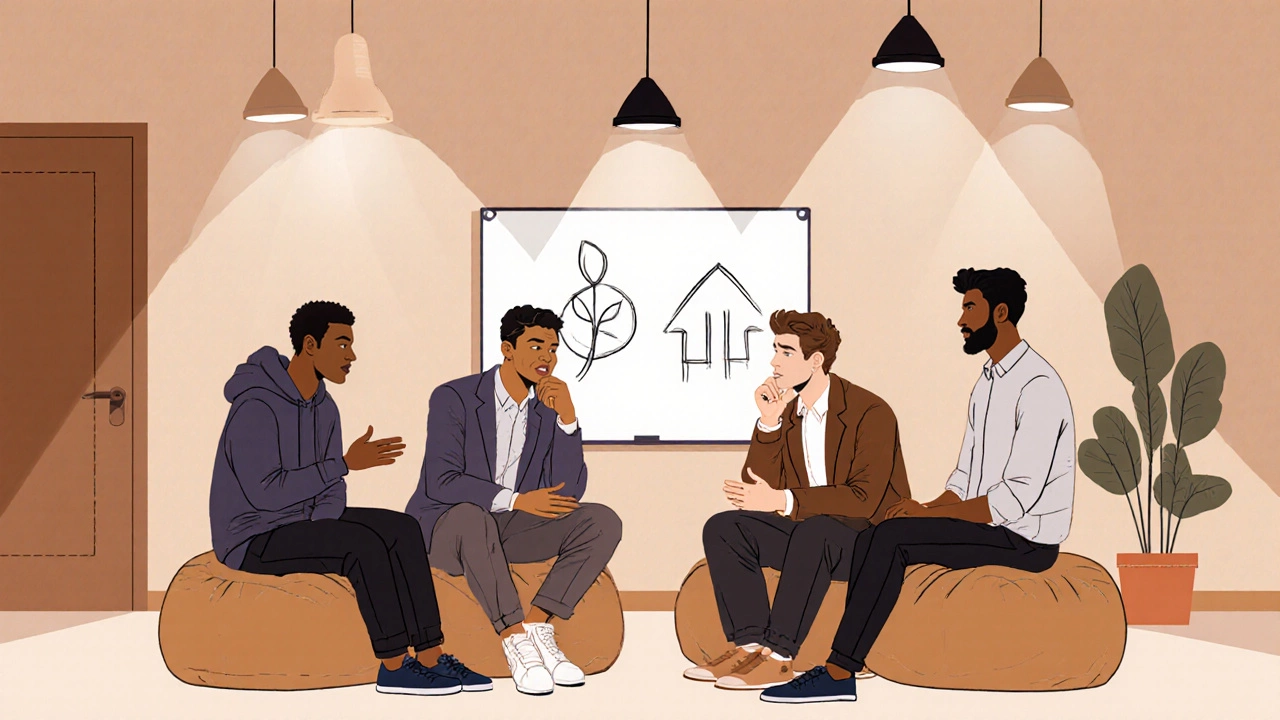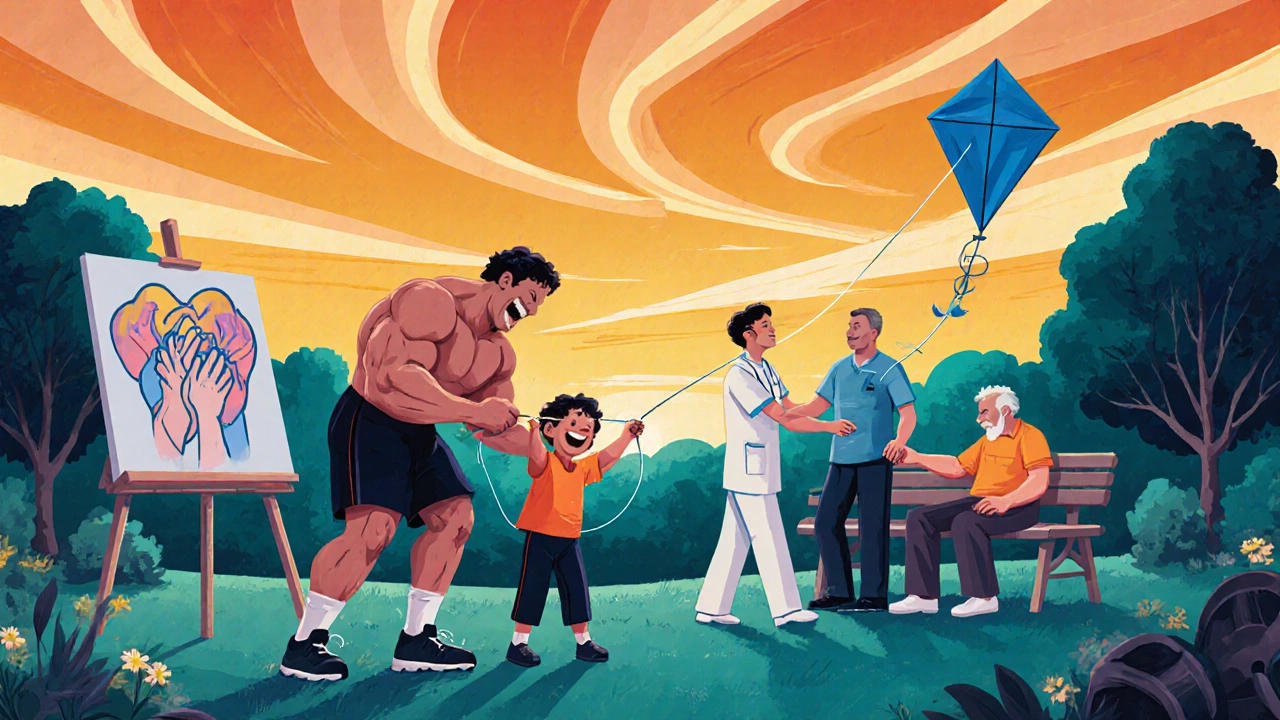Healthy Masculinity Self-Assessment Quiz
How well do you practice healthy masculinity?
Answer these 5 questions based on your recent experiences. Your results will show where you're excelling and where growth is possible.
Your Healthy Masculinity Assessment
Score: / 20
In 2023, a survey by the British Psychological Society found that78%of men felt pressure to hide their emotions at work or with friends. That number hasn’t dropped - it’s become a talking point for anyone wondering what it means to be a man today. Below we break down the idea of healthy masculinity, why it matters, and how you can live it everyday.
What is Healthy Masculinity?
Healthy masculinity is a set of attitudes and behaviours that allow men to express themselves fully without harming themselves or others. It embraces emotional openness, respect for all genders, and a commitment to personal growth while still honoring the strengths traditionally linked to masculinity, such as confidence and responsibility. In short, it’s about being true to yourself and supportive of those around you.
Why the Conversation Matters Now
Four big forces have pushed this topic into the spotlight:
- Rising mental‑health challenges: Suicide rates among men aged 15‑34 remain three times higher than women in the UK.
- Social‑media echo chambers: Images of the "ideal man" often celebrate aggression and stoicism, fueling unrealistic standards.
- Workplace evolution: Remote and hybrid models demand new forms of communication, making emotional intelligence a core skill.
- Policy shifts: Governments are funding programs that teach consent and respectful relationships in schools.
Each of these trends underscores the need for a clearer, more compassionate model of manhood.
Core Pillars of Healthy Masculinity
Think of these pillars as the building blocks you can develop one by one.
- Emotional intelligence is the ability to recognise, understand, and manage your own emotions and those of others. Studies from the University of Cambridge show that men who score high in emotional intelligence are 30% less likely to experience workplace burnout.
- Vulnerability means allowing yourself to be seen, even when it feels uncomfortable. Research published in the Journal of Men's Health links regular vulnerability practice with lower cortisol levels, a key stress hormone.
- Respect for gender norms involves questioning stereotypes that limit both men and women. Men who actively challenge rigid gender expectations report higher relationship satisfaction.
- Responsibility is about owning your actions, from keeping promises to seeking help when needed. It’s a shift from “do‑or‑die” to “do‑and‑learn”.
- Adaptability means staying open to change-whether it’s a new job role, a shifting family dynamic, or evolving cultural values.

Healthy vs. Toxic Masculinity: A Side‑by‑Side Look
| Aspect | Healthy Masculinity | Toxic Masculinity |
|---|---|---|
| Emotional expression | Encourages honest sharing; sees feelings as data. | Suppresses emotions; equates feelings with weakness. |
| Relationship style | Collaborative, seeks consent, values equality. | Domineering, often ignores boundaries. |
| Self‑worth | Based on growth, effort, and authenticity. | Linked to power, dominance, and external validation. |
| Response to stress | Uses communication, seeks support. | Turns to aggression, substance use, or isolation. |
| Impact on community | Fosters mentorship, teamwork, and safety. | Creates fear, competition, and exclusion. |
Practical Steps to Build Healthy Masculinity
Here’s a simple checklist you can start using today.
- Check in with yourself: Spend five minutes each morning naming what you feel - stress, excitement, fatigue - without judging.
- Talk it out: Choose a trusted friend or a therapist and share one vulnerable thought per week.
- Learn consent: Before any physical or emotional interaction, ask clear, open‑ended questions and respect the answer.
- Find a role model who demonstrates the traits you admire. Observe how they handle conflict and praise their approach.
- Practice active listening: Mirror back what the other person said before adding your view.
- Challenge a gender norm each month - whether it’s sharing household chores, supporting a female colleague’s idea, or wearing a style you like.
- Join a peer‑support group or a men’s circle that values openness. The sense of belonging reduces isolation.
- Prioritise mental‑health care: Schedule regular check‑ups, use mental‑health apps, or engage in mindfulness for at least ten minutes daily.
Common Myths Debunked
Myth 1: "Real men never need help."
Reality: Even elite athletes employ coaches and psychologists. Seeking help is a sign of strategic thinking.
Myth 2: "Vulnerability makes you soft."
Reality: Studies from Harvard Business School show leaders who admit mistakes are 25% more trusted by their teams.
Myth 3: "Masculinity is only about physical strength."
Reality: Modern workplaces reward emotional agility more than sheer stamina.

How Society Can Support Healthy Masculinity
Institutions play a big role. Schools that teach consent and emotional literacy from Year 7 onward see lower bullying rates. Companies that offer mental‑health days and train managers in empathetic leadership report higher employee retention. Media that showcases diverse male protagonists - from artists to caretakers - expands the definition of what’s acceptable.
Daily Checklist for Living Healthy Masculinity
- Morning mood audit (5min)
- One act of vulnerability (share a feeling or ask for help)
- Practice active listening in a conversation
- Respect or ask for consent in any interaction
- Challenge a limiting gender norm
- Connect with a peer‑support buddy
- End‑of‑day reflection: What went well, what could improve?
Frequently Asked Questions
Is healthy masculinity the same as being ‘soft’?
No. Healthy masculinity blends strength with empathy. It means using power responsibly, not avoiding it.
How can I talk about this topic with friends who think it’s a trend?
Start with personal anecdotes. Share how checking in with your feelings helped your performance at work. Data points, like the Cambridge study on burnout, add credibility.
Do I need professional help to become more emotionally intelligent?
Not always, but a therapist or coach can accelerate growth. Even short‑term workshops on EI provide measurable skill boosts.
Can healthy masculinity coexist with traditional masculine hobbies like weightlifting?
Absolutely. Pursuing physical goals can coexist with open communication and respect for others. The key is avoiding the “must be tough at all times” narrative.
What resources are best for learning about healthy masculinity?
Books like "The Way of the Superior Man" (updated edition), podcasts such as "The Art of Manliness", and UK‑based men’s mental‑health charities (e.g., CALM) are solid starting points.






